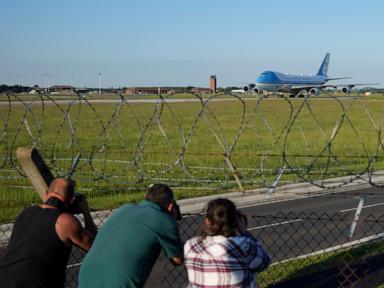ARTICLE AD BOX
TYRANT Vladimir Putin is all set to detonate nuclear weapons in the Arctic region at “any moment”, it has been revealed.
Strong traces of radioactive have been found along Norway’s border with Russia as the Kremlin says it is “fully ready” to test nuclear bombs for the first time since the Cold War.
 East2West
East2West East2West
East2West Russian dictator Vladimir Putin is facing pressure to test bombGetty
Russian dictator Vladimir Putin is facing pressure to test bombGetty Russian officials said today that if an order is given by the dictator, a test could go ahead immediately in the Arctic.
Top lords at the Kremlin are reportedly putting pressure on Putin to detonate an apocalyptic nuclear explosion as a warning to the West.
The test explosion would be at an old Soviet site first used 70 years ago in the Novaya Zemlya archipelago.
Director of the facility Rear-Admiral Andrei Sinitsyn said: “The test site is ready to resume full-scale testing activities. It is fully ready.
“The laboratory and testing facilities are ready. The personnel are ready. If the order is given, we will begin testing at any moment.”
He claimed the West has stepped up its monitoring, in a likely sign of concern over nuclear tests.
“Foreign technical intelligence is monitoring our activities on Novaya Zemlya,” he said.
Putin’s former space agency chief Dmitry Rogozin has demanded to kick off banned nuclear tests at Novaya Zemlya.
“We must make sure that [the West’s] buttocks begin to shake with fear,” he said.
A nuclear test is seen by some Putin propagandists as reinforcing his warning that permitting Western-made missiles to strike Russia would mean NATO is engaged in “war” against his country.

Meanwhile, traces of radioactive Cesium-137 were found in patches alongside Norway’s border with Russia in September.
While the cause of the spike is unknown, the levels still appear to be higher than normal.
Experts fear that Russians are testing the deadly Burevestnik – a nuclear-powered cruise missile dubbed “Flying Chornobyl” – on the Novaya Zemlya archipelago.
It is capable of cruising in the air for days – even weeks – before blitzing enemy targets.
The missile is believed to be launched by a solid-fuel rocket motor.
Then a small nuclear reactor activates in flight, which potentially allows it to stay aloft threatening Western countries almost indefinitely.
Norwegian Radiation and Nuclear Safety Authority (DSA) said that there has been some summer activity at the Burevestnik test site but it remains top secret.
“There are no official reports that the Burevestnik is tested, but indications can be seen by studying daily updated satellite images from the Arctic archipelago.
“We have seen several cargo ships and special purpose vessels in the waters outside Pankovo and over the last few weeks, Rosatom’s two large Il-76 transport planes have periodically been parked at the airport in Rogachevo at Novaya Zemlya.
“The blue-coloured aircraft are believed to conduct operations connected to the Burevestnik testings.”
Filters from Viksjøfjell and Svanhovd in Norway – close to the Russian border – are analysed once a week.
And the amount of Cesium found so far “poses no risk for humans or the environment.”
The Observer said “It is unlikely that such releases are coming from a naval reactor in operation at sea.
“Small leakages of Cesium-137 are more likely to appear during start-up or maintenance of a reactor or from handling spent nuclear fuel.”
Norway shares a 121-mile border inside the Arctic Circle with Russia’s highly militarised Murmansk region.
A report by the Nuclear Threat Initiative – a nonprofit arms control group – said Russia had conducted 13 known tests between 2017 and 2019, all of which were unsuccessful.
One test in 2019 led to the deaths of seven people who attempted to salvage the crashed top-secret missile.
Putin dubbed them “national heroes” without explaining the details of their deaths.
It comes as Russia today reinforced its preparations for nuclear war by staging drills involving giant Yars missile launchers in the Ivanovo region.
The Yars missiles are currently the main ground-based component of the Russian strategic nuclear force.
The Mach 25 missiles have a range of up to 7,500 miles, making them capable of striking the US.
Putin's not so deadly 'Flying Chernobyl' missile
MORE than a dozen tests of Burevestnik have been conducted by Russia and all of them have reportedly failed.
The Burevestnik is viewed by the Russian dictator as a game-changing “doomsday” weapon with an unlimited range.
It is seen by the Kremlin as a low-flying “stealth” cruise missile incapable of interception by existing Western air defences and delivering nuclear warheads anywhere around the globe.
Putin has called it “a radically new type of weaponry” with “unlimited range and unlimited ability to manoeuvre”.
The dictator announced the weapon in 2018, one of five game-changing missile systems he claimed were superior to Western models.
Reports from the American intelligence suggest the rocket never managed to fly more than 35 km [22 miles], its longest flight lasted only two minutes.”
 East2West
East2West East2West
East2West.png)
 2 months ago
4
2 months ago
4








 English (US)
English (US)